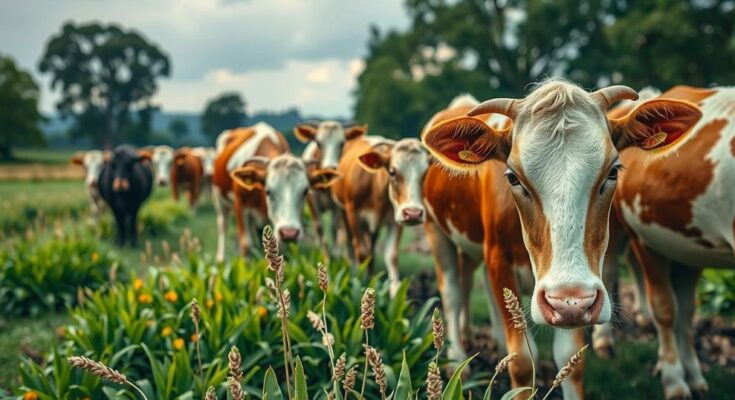The article emphasizes the vital contributions of livestock to climate action and food systems, particularly in Africa, where they are essential for rural livelihoods. Despite being often viewed negatively in environmental discussions, properly managed livestock can enhance biodiversity and serve as a significant resource in mitigating climate change impacts. Furthermore, international policy must prioritize investment in sustainable livestock systems to support both environmental health and economic resilience.
Climate change policies must not overlook the potential contributions of livestock to environmental sustainability. When managed sustainably, livestock can play a significant role in climate action while supporting vulnerable populations. In Africa, livestock is an essential part of the food system and rural economies, with approximately 400 million cattle present on the continent, a sector responsible for around 30 to 40 percent of the agricultural gross domestic product. Livestock provides not only critical nutrition through meat, milk, and eggs—key in combating malnutrition—but also acts as a stable source of income when alternative livelihoods are scarce. However, livestock is often seen primarily as a source of environmental issues like habitat loss and greenhouse gas emissions. This limited perspective results in insufficient financial investment in this crucial sector. As significant international conferences regarding climate change and biodiversity convene, there is a pressing need to rectify misconceptions surrounding livestock. In many communities, particularly in countries like Kenya, animals such as cattle and goats are vital in addressing intensifying climate and environmental challenges. When managed properly, livestock can aid in biodiversity conservation. Systems of grazing that are well-managed have the potential to maintain ecosystems and support the regeneration of native plant species in degraded regions. Communities like the Maasai and Samburu have utilized grazing as a method to enhance both income and biodiversity, exemplifying this principle. Additionally, framing livestock solely in terms of methane emissions neglects their broader potential to support climate solutions. Improved rangeland management and climate-smart feeding practices can notably reduce emissions. For example, the inclusion of climate-resilient forage in grazing systems not only enhances productivity but also reduces emissions intensity of meat and dairy production. Moreover, rangelands, often dismissed as wastelands, are significant carbon sinks. Effective management can potentially facilitate substantial climate mitigation. In terms of adaptation, livestock serves as an essential resource for communities grappling with climate variability. Pastoralists in Kenya adeptly manage livestock movements in response to rainfall changes, thereby safeguarding resources and promoting sustainability. Indigenous livestock breeds, such as East African Zebu cattle, are especially important as they have adaptations allowing them to thrive on minimal and poor-quality forage, thus bolstering resilience against climate challenges. With land degradation on the rise, sustainable livestock management emerges as a viable solution for land rehabilitation. A notable percentage of global rangelands are currently experiencing degradation. However, livestock practices like rotational grazing can enhance soil health and restore landscapes, facilitating the recovery of vital ecosystems. To address the critical environmental challenges, it is imperative that international climate finance prioritize sustainable livestock systems. This sector is not an adversary in the battle against climate change; instead, it represents an integral part of the solution, especially in regions where livelihoods are intertwined with livestock farming. Ultimately, re-evaluating the role of livestock within climate strategies is essential for fostering both environmental health and economic resilience. Financial and institutional support aimed at sustainable livestock management can yield significant benefits, not only for the environment but also for the communities that depend on them for their livelihoods.
Livestock farming is central to the agricultural framework in Africa, constituting a vital source of food and income for millions. However, the environmental impact of livestock has led to criticism and a push for policies that may inadvertently neglect the socioeconomic value of these animals. Given their role in food security and economic stability, it is essential to understand livestock management not merely as a source of greenhouse gas emissions but as a potential ally in environmental conservation and climate mitigation efforts.
In conclusion, the perspectives on livestock within climate policies must evolve to recognize their multifaceted roles in biodiversity conservation, climate mitigation, and sustenance for rural communities. By embracing sustainable livestock approaches and prioritizing finance for this sector, stakeholders can address environmental challenges while safeguarding the livelihoods that depend on these animals. Livestock should be seen not as a problem but as part of the solution in the journey towards a more sustainable and resilient future.
Original Source: www.aljazeera.com




